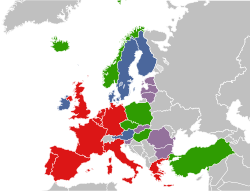Western European Union
| Western European Union Union de l'Europe occidentale |
||||||||
| Defensive alliance | ||||||||
|
||||||||
|
||||||||
| Capital | Brussels | |||||||
| Political structure | International organisation | |||||||
| Historical era | Cold War | |||||||
| • | Treaty of Brussels | 17 March 1948 | ||||||
| • | London and Paris Accords | 21 October 1954 | ||||||
| • | Treaty of Lisbon | 1 December 2009 | ||||||
| • | Abolition | 30 June 2011 | ||||||
|
||||||||
| Today part of |
|
|||||||
The Western European Union (WEU; French: Union de l'Europe occidentale, UEO) was an international organisation and military alliance, tasked with implementing the Modified Treaty of Brussels (1954), an amended version of the original 1948 Treaty of Brussels. The WEU was established by seven European nations allied with the United States (the Western Bloc and NATO members) during the Cold War.
After the end of the Cold War, WEU tasks and institutions were gradually transferred to the Common Security and Defence Policy of the geographically larger, and in terms of integration more comprehensive, European Union. This process was completed in 2009 when a solidarity clause between the member states of the European Union, which was similar (but not identical) to the WEU's mutual defence clause, entered into force with the Treaty of Lisbon. The states party to the Modified Treaty of Brussels consequently decided to terminate that treaty on 31 March 2010, with all the remaining WEU's activities to be ceased within 15 months. On 30 June 2011 the WEU was officially declared defunct.
The Treaty of Brussels was signed by the United Kingdom, France, Belgium, Luxembourg, and the Netherlands on 17 March 1948. It was a mutual intergovernmental self-defence treaty which also promoted economic, cultural and social collaboration.
...
Wikipedia


